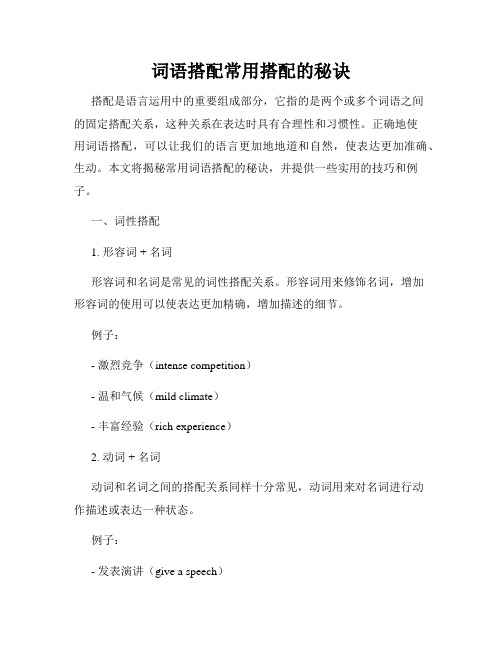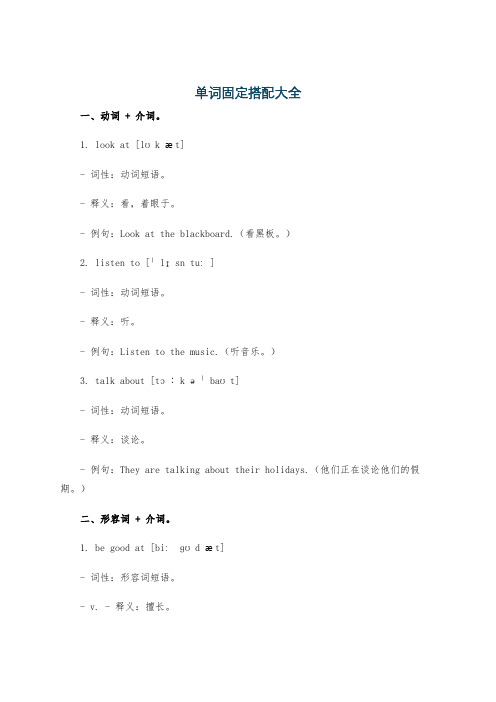常见词性及搭配 (1)
英语词性用法(常用)原创

英语词性常用一.动词(v.)1.be +形容词she is shy. 还有的是be动词+形容词(+for sb)+to do sth2.系动词+形容词常见的系动词有seem(好像)look, feel(感觉)make(使……)smell(闻起来)taste(尝起来)3.一般的动词+副词she plays basketball happily4.一般动词+名词及物动词+名词(vt + n )he is reading books.不及物动词+介词加名词(vi +prep +n)he is looking at pictures.二.副词(ad.)1. 行为动词+副词,表示做某事的态度、方式等walk carefully、said angrily2.副词+形容词,表示程度等really beautiful、quite right三.形容词(a.)1. be动词/系动词+形容词(同一)2. 形容词+名词a red apple.3. 副词+形容词(同二)四.介词(prep.)介词+宾语(名词、代词、ing动词等)talk about the movies、give up smoking、This is for you常见的搭配:to do sth(若非不定式则用to doing sth) about sth/doing sthof+sthfor+sb练习:介词/动词/名词1.With the _____(develop)of China, all the children can go to school.2.We are here to _____(protect) the public with a service.动词/名词/形容词/副词1.The two sides failed to reach _____(agree).2.I feel very tired and _____(sleep)because I stayed up last night.3.Can you answer the difficult question _____(proper)?。
高考英语词性知识点总结

高考英语词性知识点总结一、词性的定义与分类词性是指单词在句子中担任的基本语法角色,是确定单词在句子中位置和函数的重要依据。
英语中常见的词性有名词、代词、形容词、副词、动词、介词、连词和感叹词。
1. 名词(Noun):用来表示人、事、物、地点、抽象概念等的名称。
例如:dog(狗)、book(书)、happiness(幸福)等。
2. 代词(Pronoun):用来代替名词并在句子中担任名词的角色。
例如:he(他)、this(这个)、everyone(每个人)等。
3. 形容词(Adjective):用来修饰名词或代词,表达事物的性质、状态、特征等。
例如:beautiful(美丽的)、big(大的)、happy(快乐的)等。
4. 副词(Adverb):用来修饰动词、形容词、副词等,表示时间、地点、程度、方式等。
例如:quickly(快速地)、very(非常)、here(这里)等。
5. 动词(Verb):表示动作、存在、状态等。
动词可以分为及物动词和不及物动词。
例如:eat(吃)、run(跑)、be(是/存在)等。
6. 介词(Preposition):用来引导名词或代词进行修饰,表示方位、时间、原因等关系。
例如:in(在……之内)、on(在……上面)、for(为了)等。
7. 连词(Conjunction):用来连接词汇、短语、从句等。
例如:and(和)、but(但是)、if(如果)等。
8. 感叹词(Interjection):用来表达强烈的情感、感叹、呼唤等。
例如:oh(哦)、wow(哇)等。
二、常见的词性转换词性转换是指根据上下文和词汇的语法搭配,将一个词的词性转换成另一种词性。
1. 名词转动词:通过在名词前添加动词前缀(如re-, un-, de-等)或后缀(如-ize, -ify等),改变词性。
例如:friend(名词,朋友)→befriend(动词,与某人交朋友).2. 形容词转副词:一般在形容词后面加-ly,如slow(形容词,慢的)→slowly(副词,慢慢地)。
词语搭配常用搭配的秘诀

词语搭配常用搭配的秘诀搭配是语言运用中的重要组成部分,它指的是两个或多个词语之间的固定搭配关系,这种关系在表达时具有合理性和习惯性。
正确地使用词语搭配,可以让我们的语言更加地地道和自然,使表达更加准确、生动。
本文将揭秘常用词语搭配的秘诀,并提供一些实用的技巧和例子。
一、词性搭配1. 形容词 + 名词形容词和名词是常见的词性搭配关系。
形容词用来修饰名词,增加形容词的使用可以使表达更加精确,增加描述的细节。
例子:- 激烈竞争(intense competition)- 温和气候(mild climate)- 丰富经验(rich experience)2. 动词 + 名词动词和名词之间的搭配关系同样十分常见,动词用来对名词进行动作描述或表达一种状态。
例子:- 发表演讲(give a speech)- 提供帮助(offer assistance)- 建立关系(establish a relationship)3. 动词 + 副词动词和副词的搭配关系可以用来表示动作的方式、程度或频率。
例子:- 快速行动(move quickly)- 仔细观察(observe carefully)- 频繁出现(appear frequently)二、介词短语搭配介词短语搭配是指介词和它后面的名词短语之间的固定搭配关系。
正确使用介词短语可以使表达更加准确和自然。
例子:- 对...感兴趣(be interested in)- 依靠...(rely on)- 担心...(be worried about)三、固定搭配固定搭配是指由两个或多个词语组成的固定词组,它们在表达时具有固定的搭配关系,不能随意更改顺序或替换其中的词语。
例子:- 捧腹大笑(laugh one's head off)- 平静下来(calm down)- 逐渐增加(gradually increase)四、惯用搭配惯用搭配是指在特定语境下通常使用的固定搭配,它们是根据语言使用的习惯形成的。
英语各种词性的用法是什么

容词。
2)有些以 -ly 结尾既为形容词,也为副词。
daily,weekly,monthly,yearly,early
The Times is a daily paper.
The Times is published daily.
用形容词表示类别和整体
某些形容词加上定冠词可以泛指一类人, 与谓语动词的复数连接。 如:the dea数词代表分母。分子大于 1 时,分子的序数词用单
数,分母序数词用复数: 1/3 one-third ; 3/37 three and three-sevenths
形容词的用法
以-ly 结尾的形容词
1)friendly, deadly,lovely,lonely,likely,lively, ugly,brotherly,仍为形
the living,the rich, the poor,the blind,the hungry
多个形容词修饰名词的顺序
限定词 --数词 --描绘词 --(大小,长短,形状,新旧,颜色 ) --出处 --材料性质,类 别 -- 名词 a small round table; a tall gray building;a dirty old brown shirt;a famous German medical school 副词的用法 方式副词 能够表达出某人完成某事的方式,它最常与行为动词搭配使用。方式副词包括: slowly(慢慢地)、 fast(迅速地)、 carefully(小心地)、 carelessly(粗心地)、 effortlessly(不费力地)、 urgently(急切地)。 方式副词可以放在句末,或者直接放在动词后。 时间与频率副词
英语各种词性的用法是什么 在英语中,词汇有很多种词性,各个词性有相对应的名称及缩写,包括名 词、动词、形容词、副词、助动词、连接词、冠词、代词等等。 名词的用法 名词复数 1)可数名词结尾加 s/es 2)特殊单词单复数同形,如 sheep,fish,Chinese 3)特殊单词复数不规则变化,如 foot-feet, woman-women,tooth-teeth 4)集体名词,以单数形式出现,但实为复数,如 people, police 名词所有格 1) 单数名词词尾加“‘ s”,复数名词词尾没有 s,也要加“’ s”,如 the boy ‘s bag 男孩的书包, men’s room 男厕所。 2) 若名词已有复数词尾 -s ,只加“‘”,如: the workers’ struggle工人的 斗争。 3) 凡不能加“‘ s”的名词,都可以用“名词 +of +名词”的结构来表示所有关 系,如: the title of the song歌的名字。 代词的用法 代词分为人称代词、物主代词、指示代词、反身代词、相互代词、疑问代词、 关系代词、连接代词和不定代词九种 动词的用法 连系动词类 ①变化类 : become, get, turn, grow, make,
初中英语十大词性详解+100条固定搭配

初中英语十大词性详解+100条固定搭配一、词性的分类词类又叫词性,英语单词根据其在句子中的功用,可以分成十个大类。
1.名词noun n. student 学生2.代词pronoun pron. you 你3.形容词adjective adj. happy 高兴的4.副词adverb adv. quickly 迅速地5.动词verb v. cut 砍、割6.数词numeral num. three 三7.冠词article art. a 一个8.介词preposition prep. at 在...9.连词conjunction conj. and 和10.感叹词interjection interj. oh 哦前六类叫实词,后四类叫虚词。
二、名词名词复数的规则变化名词的格在英语中有些名词可以加“‘s ”来表示所有关系,带这种词尾的名词形式称为该名词的所有格,如:a teacher ’s book 。
名词所有格的规则如下:(1)单数名词词尾加“'s”,复数名词词尾没有s,也要加“'s”,如the boy‘s bag 男孩的书包,men’s room 男厕所。
(2)若名词已有复数词尾-s ,只加“'”,如:the workers’struggle工人的斗争。
三、代词大多数代词具有名词和形容词的功能。
英语中的代词,按其意义、特征及在句中的作用分为:人称代词、物主代词、指示代词、反身代词、相互代词、疑问代词、关系代词、连接代词和不定代词九种。
人称代词的用法:指示代词指示代词分单数(this / that)和复数(these / those)两种形式,既可作限定词又可做代词。
疑问代词指人:who,whom,whose指物:what既可指人又可指物:which四、冠词冠词是位于名词或名词词组之前或之后,在句子里主要是对名词起限定作用的词。
冠词是一种虚词。
不定冠词a (an)与数词one 同源,是“一个”的意思。
单词固定搭配大全

单词固定搭配大全一、动词 + 介词。
1. look at [lʊk æt]- 词性:动词短语。
- 释义:看,着眼于。
- 例句:Look at the blackboard.(看黑板。
)2. listen to [ˈlɪsn tuː]- 词性:动词短语。
- 释义:听。
- 例句:Listen to the music.(听音乐。
)3. talk about [tɔːk əˈbaʊt]- 词性:动词短语。
- 释义:谈论。
- 例句:They are talking about their holidays.(他们正在谈论他们的假期。
)二、形容词 + 介词。
1. be good at [biːɡʊ d æt]- 词性:形容词短语。
- v. - 释义:擅长。
- 例句:He is good at math.(他擅长数学。
)2. be interested in [biːˈɪntrəstɪ d ɪn]- 词性:形容词短语。
- 释义:对……感兴趣。
- 例句:She is interested in reading.(她对阅读感兴趣。
)三、动词 + 副词。
1. get up [ɡet ʌp]- 词性:动词短语(v. + adv.)- 释义:起床。
- 例句:I get up at six o'clock every day.(我每天六点起床。
)2. put on [pʊt ɒn]- 词性:动词短语(v. + adv.)- 释义:穿上(强调动作)- 例句:Put on your coat. It's cold outside.(穿上你的外套。
外面很冷。
)3. take off [teɪk ɒf]- 词性:动词短语(v. + adv.)- 释义:脱下(强调动作);起飞(飞机)- 例句:Take off your shoes before you enter the room.(在你进入房间之前脱掉鞋子。
英语单词的词性,用法和搭配
名词
表示人或事物的名称 代替名词、数词、形容示数目或顺序 表示动作或状态 表示动作特征 帮助说明名词所指的范围 用在名词或代词前.说明它与别的词的关系
动词
副词
冠词
介词
连词
表示人或事物的名称
代替名词、数词、形容词等
感叹词
常 见 的 十 种 词 性
副词
修饰形容词、动词、形容词的比较级和最高级 表加深程度、或置于句子开头表语气 例如:There,Widely,Suddenly
介词
用来连接地点、时间等或用来构成一个短语
冠词
用来修饰名词放在名词前 帮助说明名词所指的范围 例如A,An,The
连词
表示人或事物的名称。 例如: If,Because,But If,Because,But是用来连接两个有关联的成份 这两个成份必须是同一类型,即句子连句子、短语连短语等
感叹词
用来表示个人情感 代替名词、数词、形容词等 例如:Oh,Hello,Hi,Yeah
形容词
不可以修饰动词!!!
可以用来修饰
名词
形容词 副 词 动词
不同的词性在句中的作用和位置并不相同,介绍几种常见的搭配及在句中的作用和位置。 1.名词短语 在名词前后加上修饰或限定成分,名词进化为名词短语,所以与名词常见的搭配有 限定词+adj/名词+中心名词+介词短语 e.g.:the,small,girl,with,a,ponytail 限定词+形容词+中心名词+介词短语 名词前后加不加修饰成分要根据所表达的意思的需要。但要指出的是只有单数可数名词使用时, 其前一定要加上一个限定词。 2.及物动词+名词/名词短语/代词宾格/to do/doing 动词分为系动词和行为动词(也叫实义动词),而行为动词又分为及物动词和不及物动词 而有些动词因为意思和用法的不同,既可以作及物动词也可以做不及物动词。 及物动词使用时后面必须加名词/名词短语/代词,而不及物动词不能直接加名词/名词短语/代词 ,需要带上一个数词数词
词性搭配规律讲解
Be familiar with sth 对….熟悉Suffix 后缀-en 把形容词变动词,“使…变…”Widen 使…变宽Deep --- deepen broad---broaden 面积变宽strong --- strengthen Thick—thicken-ize 使….Criticize 批评,批判Global 全球的,地球的Globalize 使…全球化-ify 使….. 把adj.-----vt.Simple 简单的simplify 使….简化Pure 纯净的purify 使…纯净Purified water 纯净水-ate 动词后缀,较难的单词Act ivate 使…活动起来Congratulatefluctuate (价格,股市等等)波动词性搭配的规律:1.形容词+ 名词2.副词----动词/ 形容词/副词e.g. walk slowly ,very good, very much3.介词+ 名词/ v-ing/ 代词At the airport look forward to doing sth 期待做某事look after him 照顾他4.One of the/指示代词(this , these, those)/ 物主代词(my, her, his, their)+名词复数“…..之一”5.固定搭配The + 形容词比较级,the + 形容词比较级“越…,越….”look forward to doingget close to + 名词“接近…..”6.连词+ 从句(主谓宾/主谓)Not only……but alsoOr 否则…. (介词,表示或者)7.The + 形容词最高级(est)“最…..的”8.情态动词(would, will, should, could, must)/助动词(do, did, does, have ,is ,are…)+ 动词原形9.The/ a/ an/ 代词(his, this, these, our, every )+ 名词10.There be + 名词“有…. ”11.Make delivery 发货Take delivery 收货,拿货。
语文知识:词语搭配
3.形容词+名词,例:明亮的眼睛
( 甜甜)的味道 (宽广 )的大海 (满意 )的笑容 健康的(身体 ) 晴朗的(天气 ) 笔直的( 公路)
形容词+名词
绿色的(草地) 遥远的(地方) 心爱的(玩具)
寒冷的(北风 ) 酸酸的( 味道) 干净的(地面)
4.形容词+动词
轻轻地(跳 )
慢慢地(走 )
认真地(写 ) 高兴地(说 )
( 小小 )的嘴巴 ( 机灵 )的小猴 ( 凶猛 )的狮子 ( 美丽 )的花儿 ( 可爱 )的小朋友
词语搭配
1.量词+名词,例:一棵柳树
一( 片 )天空 一( 栋 )房子 一台(电视 ) 一面( 红旗)
一(匹 )马 一堆( 石头 )
2.动词+名词,例:读课文
( 拉 )二胡 (打 )篮球 ( 打扫)房间 擦( 桌子) 洗( 衣服) 珍惜(时间 )
饿得(大哭)
笑得(肚子疼 )
“的、地、得”的区别
“地”+动词 “的”+名词 “得”+形容词
词语搭配
我们学过名词、代词、动词、形容词、 量词等不同词性的词语,在使用它们时,要特 别注意准确地搭配。
1.量词+名词
一( 张 )笑脸 一( 粒 )种子 一( 头 )水牛 一( 只 )青蛙
一( 方 )手帕 一( 轮 )明月 一( 条 )小船 一( 个 )桔子
2.动词+名词
( 练 )书法 ( 挑 )担子 ( 听)音乐 ( 吹 )笛子 (保护)动物
( 画 )图画 ( 下 )象棋 ( 开 )汽车 ( 踢 )足球 (回答)问题
பைடு நூலகம்
动词+名词
种( 花草) 吃( 面包) 放( 风筝)
英语词性搭配总结
英语词性搭配总结英语词性搭配是学习英语一个重要的方面。
不同的词性之间有着特定的搭配关系,正确地使用词性搭配可以使我们的语言表达更加准确和流畅。
在本文中,我将总结一些常见的英语词性搭配,并举例说明它们在语言中的应用。
名词和形容词的搭配是最常见的一种词性搭配。
形容词通常用来描述名词的特征和性质。
比如“strong coffee”(浓咖啡),“beautiful flowers”(美丽的花朵)。
另外,形容词也可以用来表示情感、态度和观点。
比如“happy family”(幸福的家庭),“angry customer”(生气的顾客)。
动词和副词的搭配也是十分常见的。
副词常常用来修饰动词,表示动作的方式、程度或频率。
比如“run quickly”(快速地跑),“study hard”(努力学习),“speak fluently”(流利地说话)。
值得注意的是,有些动词后面只能使用特定的副词,比如“drive carefully”(小心驾驶),而不能说“drive hardly”。
名词和动词的搭配也非常重要。
有些名词与特定的动词搭配在一起,形成固定的短语。
比如“make a decision”(做决定),“take a break”(休息一下)。
这些短语的意思往往不是根据名词和动词的字面意思来理解的,而是基于惯用搭配的含义。
形容词和副词的搭配也是令人瞩目的一种词性搭配。
有些形容词与特定的副词搭配在一起,形成常见的搭配习惯。
比如“extremely hot”(极其炎热),“highly unlikely”(极不可能),“deeply grateful”(深感谢意)。
这些搭配习惯形成了一种固定的用法,我们需要记住它们的搭配关系。
另外,名词和介词的搭配也是需要我们注意的。
介词与名词的搭配通常用来表示时间、地点、方向和目的。
比如“at the office”(在办公室),“in the park”(在公园里),“on the table”(在桌子上)。
- 1、下载文档前请自行甄别文档内容的完整性,平台不提供额外的编辑、内容补充、找答案等附加服务。
- 2、"仅部分预览"的文档,不可在线预览部分如存在完整性等问题,可反馈申请退款(可完整预览的文档不适用该条件!)。
- 3、如文档侵犯您的权益,请联系客服反馈,我们会尽快为您处理(人工客服工作时间:9:00-18:30)。
英语单词的词性,用法和搭配
英语中常见的词性分为:冠词,名词,代词,动词,形容词,副词,介词,连词,助词等,
不同的词性在句中的作用和位置并不相同,介绍几种常见的搭配及在句中的作用和位置。
1.名词短语
在名词前后加上修饰或限定成分,名词进化为名词短语,所以与名词常见的搭配有
限定词+adj/名词+中心名词+介词短语 e.g. the small girl with a ponytail
限定词形容词中心名词介词短语
名词前后加不加修饰成分要根据所表达的意思的需要。
但要指出的是只有单数可数名词使用
时,其前一定要加上一个限定词。
2.及物动词+名词/名词短语/代词宾格/to do/doing
动词分为系动词和行为动词(也叫实义动词),而行为动词又分为及物动词和不及物动词而
有些动词因为意思和用法的不同,既可以作及物动词也可以做不及物动词。
及物动词使用时
后面必须加名词/名词短语/代词,而不及物动词不能直接加名词/名词短语/代词,需要带上
一个介词才能加名词/名词短语/代词(在我的理解,及的意思是到达,物的意思是东西sth,
即宾语,及物的意思就是动词和宾语紧挨着,不及物就是动词和宾语不是紧挨着,因为中间
隔着一个介词)
常见的不及物动词有:go, come, move, work, die, lie, live, rise, listen, look, agree, arrive, sit happen, stay, talk, smile, swim, run, skate, fall, travel, stand
常见的既是及物又是不及物的动词有:return, sing, teach, study, speak, drink, read, write, ride, begin, start, leave, fly
常见的系动词有:纯系动词:be, become(+adj/n.)
兼实义动词的系动词: a感官动词:look(seem), feel, smell, taste, sound(+adj/like短语)
b表示"变":get, grow, turn, go(+adj)
剩下的绝大部分是及物动词
及物动词+名词/名词短语/代词(+副词/介词短语)
不及物动词+(介词+名词/名词短语/代词)+副词/介词短语
do the homework carefully/at home listen (to me) carefully/in class
3.介词+名词/名词短语/代词宾格/doing(介词后必须加宾语)
常见的介词:
1,表时间的介词:at, before, after, since, till, until, upon, on, from, between, by, in, during, for, through
2.表地点的:at, from, between, near, beside, by, to, into, behind, in front of, before, among, past, around, above, below
3.其他:with, through, over, of, with, without, for, because of, instead of等
很多介词既可以作介词也可以作副词(关键看后面有没有宾语,如on, around, over, up),有些介词也可以作连词(关键看后面是短语还是句子before, after, since, until, for)
介词短语可以放在句末充当状语(时间地点方式状语等),可以放在名词后修饰名词(定语),
可以放在不及物动词之后形成短语动词,可以放在形容词后形成形容词短语
In the playground, the boy on the left, arrive at, be interested in
4. 副词的常见搭配
动词+副词(或副词+动词),副词+形容词,副词+副词(一定要注意各种搭配副词的位置)
动词修饰副词经常放在动词后面,也可以放在前面,副词修饰形容词/副词放在它们的前面
(除enough这个副词之外,放在被修饰词的后面),副词在句中做状语
Run quickly, carefully look at…, very good/well, too strong/slowly, old/fast enough。
